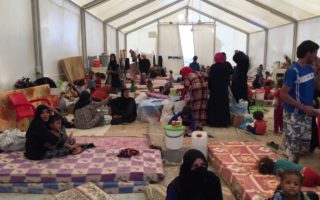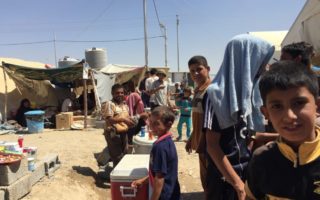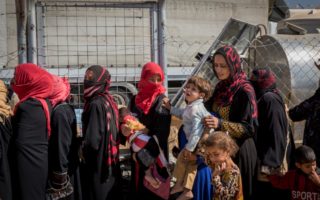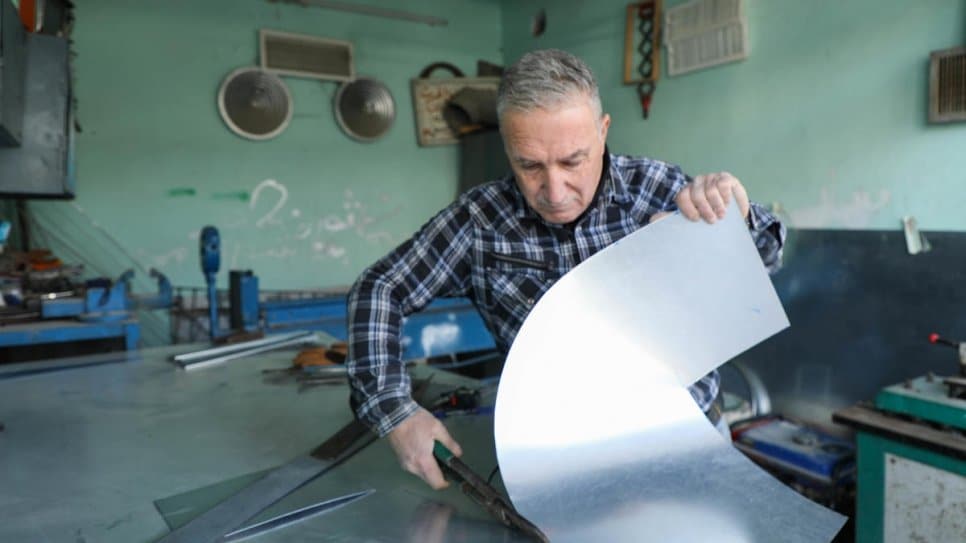
Mosul resident Saad cuts sheet metal to make wood-burning stoves for his returning neighbours.
© UNHCR/Rasheed Hussein Rasheed
Coming back to this historic district after two long years, Saad found help to repair his house. Now he is putting his skills to work so others can return home.
Now nine years old, Ashwaq was just four when ISIS took over the city. For the first three years of occupation, her father Saad kept her indoors with her siblings to protect them from the authoritarian rule imposed on local residents. They faced restrictions on everything from what they could wear to whether they could use mobile phones, with severe penalties for breaches, including public beatings and executions.
When the battle to retake the city was launched in October 2016, Saad and his family fled to another part of Mosul. They managed to avoid the worst of the fighting, which left much of the historic Old City in ruins.
“I want to bring life back…”
Now, with financial help to rehabilitate their damaged home, the family are finally moving back into their old neighbourhood. The support comes through a cash-for-shelter programme led by UNHCR, the UN Refugee Agency.
“I was very keen on going back [to] my old neighbourhood, which goes back to Assyrian times,” Saad said of the historic area of Mosul where he lived and worked. “It is 6,000 years old, and I want to bring life back to it”.
Mosul is the largest city in Ninewa governorate, where around 1.7 million formerly displaced Iraqis have now returned to their homes. Yet more than 334,000 people remain displaced.
When the fighting finally ended, more than 40,000 homes in Mosul were in need of rehabilitation.
Through its cash-for-shelter programme, which provides for up to US$4,000 for essential repairs, UNHCR has so far helped to fix up some 765 homes, ensuring safe shelter for more than 7,000 people. But given the scale of the destruction, it will take many years of continued support before things return to normal.
As he points out major landmarks to Ashwaq, such as the bridge over the Tigris River and some of the ancient homes along its banks, Saad recalls what life was like here in more peaceful times.
“People went on picnics near the river. My friends and I used to play football on the riverbank. Life was good and prosperous in Mosul back then.”
Saad’s first priority after moving back into his rehabilitated home was to reopen his metal welding workshop, which his father established back in 1978 before passing it on to his son.
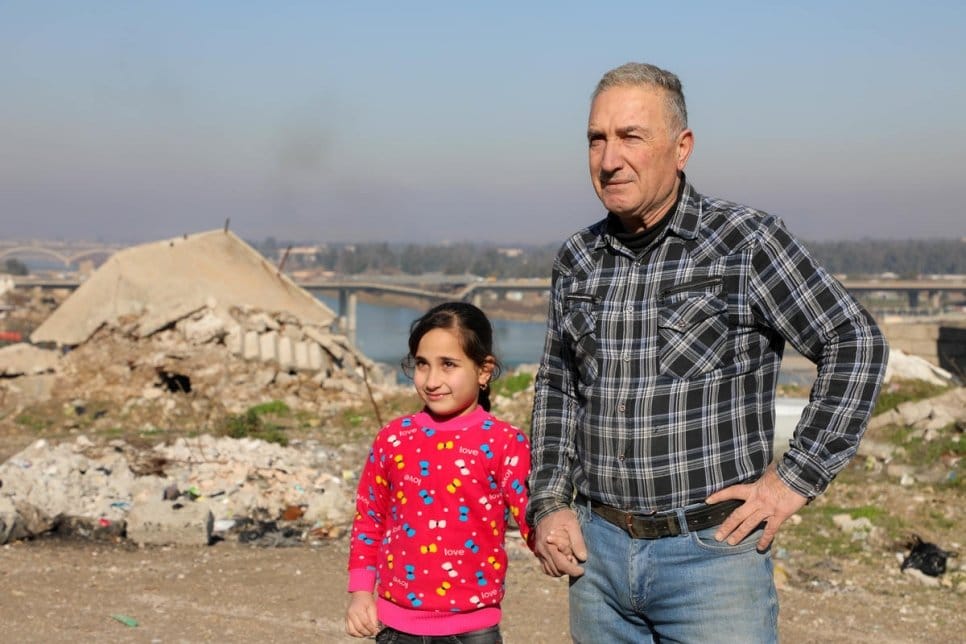
Saad and his daughter Ashwaq walk through their damaged neighbourhood in Mosul’s Old City. © UNHCR/Rasheed Hussein Rasheed
Before the conflict, most of his business consisted of making specialist aluminium ducts and ventilators for home heating and air-conditioning systems. But there was little demand for such comparative luxuries during the city’s occupation and the difficult years that followed.
When he first reopened the shop, he found that the needs of the few neighbours returning to the area were more basic, and he found a way to resume his work while lending a helping hand.
“I went back to my workshop and felt that I can help people who returned by fixing their damaged water tanks and heaters for a small cost, while many people who could not afford to pay me, I helped for free,” he explained.
He also made around 350 simple wood-burning stoves using sheet metal, which he sold to those who had no other means of keeping warm for US$5, barely enough to cover his costs.
“We are all citizens of Mosul.”
“This helped people – not only homes but also shops were reopened,” Saad said. “People deserve a second chance. Most of them are poor and they need a helping hand. We are all citizens of Mosul. Those of us who are able to should help those who are less fortunate than us.”
With people and commerce slowly returning to the neighbourhood, Saad recently resumed making parts for central air-conditioning and heating systems for the first time in more than six years.
He hopes this encouraging sign marks the start of a better life for his family and the city, and his daughter Ashwaq will once again come to recognize the neighbourhood she had forgotten as home.
“All what I want is for my children to live a good life and that I am able to provide a comfortable life for them. I hope they have a good future in Mosul.”
Originally published on UNHCR on 25 March 2020



